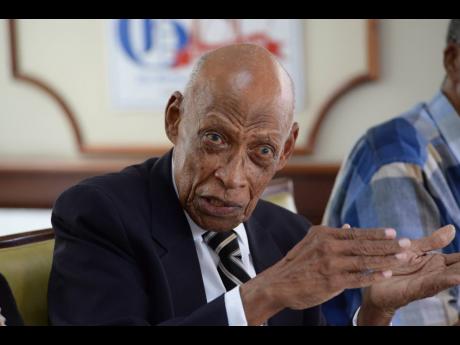Frank Phipps | For my own protection: ‘Each man’s death diminishes me’
Jamaica has been involved in a long and arduous search to find an answer to the indiscipline and the violent crime said to be gang-related, now aggravated by crime against children and women with an alarming increase of spousal murder attributed to family breakdown.
The imposition of a state of emergency from place to place, based in one area for a relatively short period, and with the Peace Management Initiative stretched to breaking point with limited success, the nation is at its wits’ end for a resolution to the problem, more so when there are two conflicting views on how we reached here.
An article in The Gleaner, Friday January 17, titled ‘The scars of slavery are real’, listed 16 of the effects of post-slavery trauma in Jamaica in response to an earlier piece alleging that slavery in Jamaica has no present-day manifestation.
This engaging controversy on the real cause of our predicament was considered by Professor Frederick Hickling in his presentation at Webster’s Church Hall five days before. The professor spoke partially in Patois, the national language promoted by many, for a better understanding of the problem; and for emphasis he used the controversial magic word that was used to confuse the slave masters:
“When di white man come yah and declared with outstretched arms: All the land and the people you see yah is mine – him mad to r**s”. And the people from Africa who were forcibly separated from family in a country where it takes a village to raise a child, were brought here, sold and resold here as second-hand machinery to work in gangs on the plantations, to survive while held in conditions of unimaginable cruelty in slavery – dem too get mad to r**s.”
In his book Owning Our Madness: Facing reality in post-colonial Jamaica, the learned professor of psychiatry points out in Chapter 27 the European delusion of white supremacy in the Caribbean from the late 15th century with a claim to all therein as his, to be enforced by war.
Later at chapter 62, he discussed Colonialism and Mental Health, and at page 69, the “possibility for an entire ethnic constellation to experience a collective delusional system resulting in sustained abnormal behaviour, irrational violence ...” “... the concept of the collective mind ...” and “the national collective structure.”
He concluded at page 87, “The sequel to poverty and political repression was the manifestation of violence at every level.”
Mental and psychological disorder from post-trauma stress is a comparatively new field of learning, which, when fully explored, may eventually explain the antisocial behaviour of many Jamaicans to which we are all now exposed – whether as victim or offender as demonstrated in our road traffic nightmare – bound in a prison of social disorder with common vicissitude of life for prisoner and superintendent.
Hopefully, some day soon we will get to know the extent of mental disorder inherited by successive generations of people of African descent in the Caribbean after centuries of colonial rule with decades of repression as chattel slaves – the dependency syndrome, the mental enslavement with the denial of humanity – made worse after emancipation with empty freedom, having nowhere to settle and not knowing the way back home.
A NEW YEAR’S RESOLUTION
Jamaica is a new and different country created as a nation out of many people from different places with different cultures, with all now welded together as Jamaicans. This is why I believe the claim for reparation should be taken more seriously by all of us, at least as a New Year’s resolution, to find out if reparation can help to address the undisciplined behaviour that threatens everyone’s life and retards progress in the society.
The demand for reparation is a call to repair minds damaged by a system of colonial rule with successive generations in enslavement. Those who were able to shake off the insanity and make us proud by their individual national-and-international achievements did not end the journey for full emancipation – too many are still left behind in depravation.
There remains a road Jamaica must travel for social justice – to compensate the victims of the crime against humanity and also to satisfy any counter claiming rights of the offenders, and at the same time to appease the community (Jamaica) where the crime was committed.
This is a claim for restorative justice where nations, institutions and individuals involved in the atrocities will work together to restore sanity of the people in a country with mutual respect, peace and one love.
Returning to the burning issue of spousal murder, a lady, appropriately named Quest, quoted in the same Friday paper, “The more things change, the more they remain the same”, and ended her search saying, “After all, one woman is one too many.”
I respectfully agree with her, only to add: This madness must stop.
Frank Phipps, QC, is a member of the National Council for Reparation. The views expressed here are not stated on behalf of the council. Email feedback to columns@gleanerjm.com


